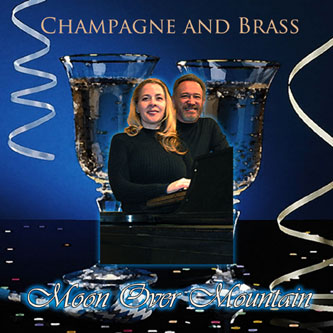 With
its stunning mix of New Age Pop and electronic instrumental music,
The Colors Of Life, the 2019 debut album by Denver,
Colorado based Moon Over Mountain, impressed music fans
and turned heads around. Now, in 2020, group founders Kenneth Lee
Roberts and Megan Buness return with their second album
called Champagne And Brass. With this second
Moon Over Mountain album, Ken and Megan continue onwards with their
subtle and sublime approach to both vocal and instrumental music.
In the spirit of The Colors Of Life, the 12-track, 2020 album
release of Champagne And Brass offers another memorable blend
of instrumental keyboard-based electronica and experimental, yet accessible
songs with vocals—some with lyrics and some with synthesized
wordless vocals that serve to entertain and even startle the listener
(in a good way). Some of the vocal tracks, such as Megan’s vocals
on “Snowfall” border on impressionistic jazz, while others
present a rare blend of New Age with touches of progressive rock.
I could see fans of progressive jazz singer Annette Peacock enjoying
Megan’s earthy vocals on some tracks here. The instrumental tracks,
such as “Close To My Heart”—composed by Megan and featuring
multi-tracked, synthesized, Gregorian-sounding wordless vocals—are
arranged with Ken’s electronic keyboards in mind. Sounding like
the perfect segue to “Close To My Heart”, “The Man
Who Spoke 10,000 Truths”—a Ken Roberts composition—is
another fascinating meld of Ken’s accessible keys and glorious
wordless electronic vocals highlighted by a unique arrangement. Bringing
the sound and vision into the 2020’s there’s even a track
here called “AOC”—a paean to the congresswoman from
New York City—with lyrics that speak up about a green new deal
and the one percent economy. Closing out the Champagne And Brass
album, that same “AOC” track is filled with drum fills that
are quite startling, no doubt inspired by the startling nature of
American politics of century 21. With the 2020 release of the 12-track
Champagne And Brass, it’s just amazing what these two
very creative musicians have created with hardly any outside intervention.
Implementing a vast array of impressive studio sounds coupled with
Ken and Megan’s expanding compositional skills, Moon Over Mountain
breathes new life into the New Age Electronica genre, as the music
world evolves into the roaring 20’s. www.moonovermountainmusic.com
With
its stunning mix of New Age Pop and electronic instrumental music,
The Colors Of Life, the 2019 debut album by Denver,
Colorado based Moon Over Mountain, impressed music fans
and turned heads around. Now, in 2020, group founders Kenneth Lee
Roberts and Megan Buness return with their second album
called Champagne And Brass. With this second
Moon Over Mountain album, Ken and Megan continue onwards with their
subtle and sublime approach to both vocal and instrumental music.
In the spirit of The Colors Of Life, the 12-track, 2020 album
release of Champagne And Brass offers another memorable blend
of instrumental keyboard-based electronica and experimental, yet accessible
songs with vocals—some with lyrics and some with synthesized
wordless vocals that serve to entertain and even startle the listener
(in a good way). Some of the vocal tracks, such as Megan’s vocals
on “Snowfall” border on impressionistic jazz, while others
present a rare blend of New Age with touches of progressive rock.
I could see fans of progressive jazz singer Annette Peacock enjoying
Megan’s earthy vocals on some tracks here. The instrumental tracks,
such as “Close To My Heart”—composed by Megan and featuring
multi-tracked, synthesized, Gregorian-sounding wordless vocals—are
arranged with Ken’s electronic keyboards in mind. Sounding like
the perfect segue to “Close To My Heart”, “The Man
Who Spoke 10,000 Truths”—a Ken Roberts composition—is
another fascinating meld of Ken’s accessible keys and glorious
wordless electronic vocals highlighted by a unique arrangement. Bringing
the sound and vision into the 2020’s there’s even a track
here called “AOC”—a paean to the congresswoman from
New York City—with lyrics that speak up about a green new deal
and the one percent economy. Closing out the Champagne And Brass
album, that same “AOC” track is filled with drum fills that
are quite startling, no doubt inspired by the startling nature of
American politics of century 21. With the 2020 release of the 12-track
Champagne And Brass, it’s just amazing what these two
very creative musicians have created with hardly any outside intervention.
Implementing a vast array of impressive studio sounds coupled with
Ken and Megan’s expanding compositional skills, Moon Over Mountain
breathes new life into the New Age Electronica genre, as the music
world evolves into the roaring 20’s. www.moonovermountainmusic.com
mwe3.com presents an interview with
MOON OVER MOUNTAIN
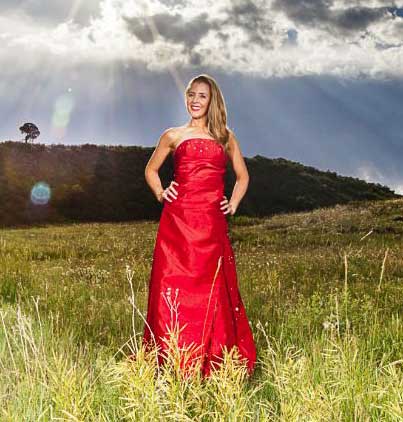 mwe3:
What’s doing in Denver? So sad to watch the world melt down with
this virus. Is it time for something in the air? I’ve been smelling
some toxic like substance in the air. Someone said it’s related
to 5G which is even more scary. Anyway what I wouldn’t give for
a breath of fresh rocky mountain way air.
mwe3:
What’s doing in Denver? So sad to watch the world melt down with
this virus. Is it time for something in the air? I’ve been smelling
some toxic like substance in the air. Someone said it’s related
to 5G which is even more scary. Anyway what I wouldn’t give for
a breath of fresh rocky mountain way air.
Ken Roberts: Reactions to the virus haven’t been much
different here than anywhere else but there are no other cities of
any size nearby, so as major cities go, we may be hit a little more
lightly than elsewhere. The air quality in the city is a little better
than when I first arrived but you’ve still got to get outside
of it to get a breath of really fresh air.
With global supply chains affected for the indefinite future, I suspect
that 5G implementation will be greatly slowed, or not happen at all.
That may be a good thing.
Megan Buness: I taught a year in China in Hangzhou, a city
near Wuhan where the outbreak originated. When Denver started becoming
precautious this last week I emailed with my friend, a teacher at
the school. She said within this week that it's been 22 days since
a new case. So as shaken as we are by this uncertainty, we can see
the other side of this is coming.
mwe3: How did you decide on the title of the Champagne And
Brass album? It makes a great album opener even though it catches
you a bit unaware. When and where was the music on the album written
and recorded? Is Megan on that track anywhere? She’s there in
spirit for sure...
Ken Roberts: Well, the album title follows the track title,
of course. Glad you thought it made a great opener. The track is a
bit “fizzy” and, of course, features a lot of brass, so
the title more or less suggested itself. The material was entirely
written and recorded here in Denver. Some of the tracks were very
challenging technically – “First Snowfall” and “Have
Our Dreams Come to This?” in particular, the latter because of
the many instruments and the extreme dynamics of the track. The former
because analog is far more difficult than digital to do well. No,
Megan isn’t on that track, but you’re right, she’s
there in spirit on all of the pieces.
Megan Buness: I started my undergraduate music degree as a
French Horn major, so it was a pleasure recording live horn potentially,
we eventually let it go, to be blended with Ken's orchestration as
an Easter Egg allusion in our first track on the album.
mwe3: The Brass element of the title must allude to
the brass like way the Ken’s keyboards build upon the music.
Also the word-less synths sound remarkably like Megan being sampled.
I know you tried to explain that it was different. How did you get
such realistic voice-like keyboard sounds on for example, “Close
To My Heart” and also “The Man Who Spoke 10,000 Truths”
as well?
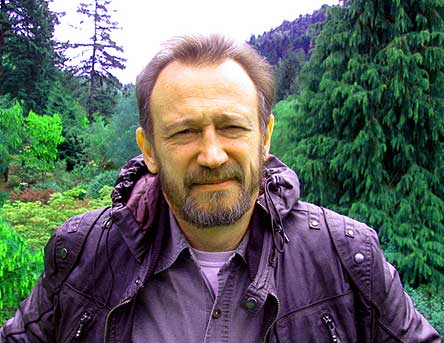 Ken Roberts:
Brass instruments have ended up being a nicely unifying element in
what is otherwise a quite diverse set of recordings. A number of the
world’s leading chorale groups have been sampled now, so sound
quality is primarily a matter of how much money an artist is willing
to spend. This is quite enabling, as it makes it possible to do things
that would otherwise be prohibitively expensive. It’s also far
better from a composer’s standpoint, because it’s quite
difficult to truly “hear” the voices you’re writing
for apart from this approach. Although these sampled voices can indeed
be “played” like any instrument, they’re quite different
in nature from traditional digital keyboard sounds, as they really
are actual voices. However, I do also use digital voices as well –
they have a slightly eerie, otherworldly quality that can nicely complement
the sampled voices.
Ken Roberts:
Brass instruments have ended up being a nicely unifying element in
what is otherwise a quite diverse set of recordings. A number of the
world’s leading chorale groups have been sampled now, so sound
quality is primarily a matter of how much money an artist is willing
to spend. This is quite enabling, as it makes it possible to do things
that would otherwise be prohibitively expensive. It’s also far
better from a composer’s standpoint, because it’s quite
difficult to truly “hear” the voices you’re writing
for apart from this approach. Although these sampled voices can indeed
be “played” like any instrument, they’re quite different
in nature from traditional digital keyboard sounds, as they really
are actual voices. However, I do also use digital voices as well –
they have a slightly eerie, otherworldly quality that can nicely complement
the sampled voices.
Megan Buness: Some of our tracks combine my voice with the
sampled voices. When teaching computer music, I've mused to my classes
that with our current technology the composer now has the luxury of
hearing these sampled sounds immediately and working in real time
with orchestration choices.
mwe3: Tell us how you recorded the new album, what was the
studio set up like and can you contrast recording Champagne And
Brass with the way you recorded the Colors Of Life album?
Were there any refinements in the recording process for the Champagne
And Brass album?
Ken Roberts: The vocal tracks were recorded separately by Megan
after the instrumental tracks were laid down, and then integrated
in my home studio. The overall process was much the same for both
albums, but I’ve been trying to learn more about sound engineering,
which is a complex universe unto itself, and made some progress in
that direction between the two albums. Also, Champagne And Brass
is derived from AIF-format masters, which are lossless. This makes
for a far more authentic sound than what we had been doing.
Megan Buness: As Ken says, I am listening to the instrumental
track when I add the vocal tracks. Sometimes I'm involved in the process
earlier when I send him MIDI compositions, which he then orchestrates
- on our first album: “Yes, I Am Here”, “The Face In
The Moon” and “Heart Of The Song” and on this album:
“Close To My Heart” and “Passing Sacred Ground”.
When you listen back to these albums, some were accompanied by my
singing lyrics that were sent at the same time as the MIDI, others
are just the compositions orchestrated. If you are hearing refinements
in the recording process, we're happy about that! We're excited that
Ken provided many of our lyrics for this album. This is really a fun
process that we have developed...
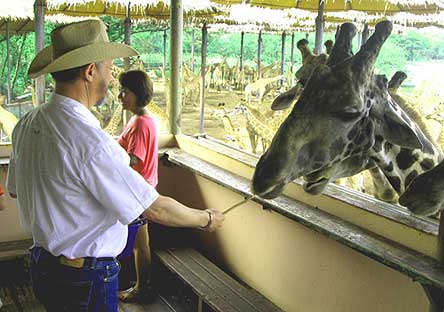 mwe3:
“First Snowfall” is very jazzy sounding. I think this is
the first snow-related song I’ve heard in a while. I’ve
been in South Florida so long I forgot what slush is as it was 95
again with a soaring UV index! Ken was telling me about the slush
in and around Denver and I got jealous! Lol...
mwe3:
“First Snowfall” is very jazzy sounding. I think this is
the first snow-related song I’ve heard in a while. I’ve
been in South Florida so long I forgot what slush is as it was 95
again with a soaring UV index! Ken was telling me about the slush
in and around Denver and I got jealous! Lol...
Ken Roberts: Yes, “First Snowfall” is, more or less,
a straight-up jazz track, though not very conventionally so. Some
of the other pieces also have more of a jazz quality than The Colors
Of Life, which only has one track, “Dry Your Eyes”,
with a similar feel. In general, it seems to me that we now live in
a post-genre era in which artists can utilize the approaches developed
by various genres in much the same way that they make use of instruments
or lyrics to communicate what it is that they’re trying to say.
Not only that, but there are also an enormous number of interesting
ideas that can arise from asking yourself questions like: what would
this piece sound like if it made use of elements from both jazz and
classical? Today, something may be going wrong creatively or imaginatively
if a composer is forever working in the same genre. It’s probably
true that it’s a little dangerous to challenge your listeners
as much as you challenge yourself, but in the long run I suspect they’ll
find that more rewarding, provided that the composer is still writing
consistently good music.
Yes, I remember my own Florida years of perpetual heat and humidity,
and don’t much regret leaving that behind. Slush can be interesting
for about five minutes, but after that it loses its appeal, particularly
when you have to drive in it. So, maybe nothing to be too envious
of, and definitely more of the down side of the Colorado climate.
Megan Buness: While snow seems distant to you, we had a typical
winter week here in Denver: the week started with a high near 70 degrees
and by midweek we experienced snow all day, piling to 8 inches. Some
background on the song: I was looking out the window between two buildings
the moment the first snowflake floated down at the beginning of a
snowfall. The lyrics unfolded from that moment. Ken’s instrumentation
fit perfectly with these lyrics.
mwe3: How about “Alone In The City”. Sounds like
trying to date in the online world. Anyway it sounds serious. The
tambourine gives it a good timing, sort of like the sound of a ticking
clock. Interesting that Ken wrote the lyrics and the song, yet Megan
sings it quite perfectly. You guys are really on the same page.
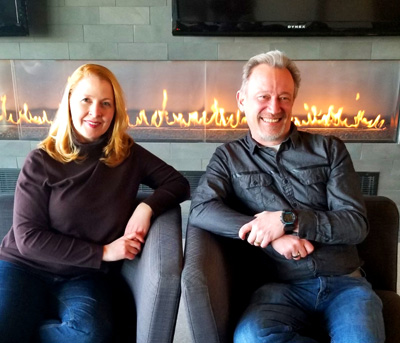 Ken Roberts:
Thematically “Alone” goes back to my first years in Denver,
after leaving Florida and all of my friends and family there behind.
I’d occasionally wander around downtown Denver feeling miserable,
and looking at everyone else that was hooked up like they were inhabitants
of a different world I had no place in. Curious how completely alone
you can feel while surrounded by thousands of people. And the effect
is further compounded when nothing that you see on a daily basis is
familiar.
Ken Roberts:
Thematically “Alone” goes back to my first years in Denver,
after leaving Florida and all of my friends and family there behind.
I’d occasionally wander around downtown Denver feeling miserable,
and looking at everyone else that was hooked up like they were inhabitants
of a different world I had no place in. Curious how completely alone
you can feel while surrounded by thousands of people. And the effect
is further compounded when nothing that you see on a daily basis is
familiar.
Megan did a truly fabulous job of taking this track on board, and
making it into something of her own. She has a remarkable capacity
for doing that – as I suspect listeners will soon be discovering.
Megan Buness: Thank you both. I find I communicate best through
music. And I agree, Ken's lyrics are spot-on at expressing the feeling.
mwe3: “Have Our Dreams Come To This” has a very uplifting
spirit. It has a vintage sound but a modern beat and the brass-like
keyboards have a great sound. Again this track features sampled voices.
I call them “Angel Voices”. Sounds like angels watching
us.
Ken Roberts: It’s been quite interesting to discover how
people are reacting to this piece. It’s one of two compositions
that were written shortly after concluding a failed love affair with
a Thai woman. Both were composed while in a very fraught state indeed,
and at the time served much more as psychotherapy than music. There
are something like 25 different instruments on the track, which made
getting good sound quality quite difficult, particularly as there
are also quite unusual sound dynamics – for example, going from
very soft passages to much louder ones, with various stabs along the
way. Certainly, it would be wonderful if there were angels watching
over us, but I’m afraid I have to file that idea away in the
“unknowable” folder. On the other hand, though, when listening
to them while composing it almost does seem at times as though they
belong to beings who well-understand the many vicissitudes of human
life, and would help if they could.
Megan Buness: I had lyrics that didn't exactly fit what Ken
was feeling for this one. We are playing with releasing the one with
vocals at a later date.
mwe3: Tell us about “Close To My Heart”. Those sampled
voices sound very much like Megan… Either way it’s excellent.
How did Megan go about composing this track?
Ken Roberts: Thanks so much. It’s among my favorites,
too. It’s essentially a waltz, a form which hasn’t usually
had any sort of vocal accompaniment – so, of course, I thought
it might be interesting to supply one. I also tried to bring forward
the sense of joy that seemed to be quietly lurking there.
 Megan
Buness: "Close To My Heart" is about pleasures experienced
and wanting to hold them close to my heart. I gave Ken the MIDI track
of the composition. He did wonders with the orchestration.
Megan
Buness: "Close To My Heart" is about pleasures experienced
and wanting to hold them close to my heart. I gave Ken the MIDI track
of the composition. He did wonders with the orchestration.
mwe3: “The Man Who Spoke 10,000 Truths” is another
high point of Champagne And Brass with its mix of synth voices
and brass. Sounds like a sax! Lol How did Ken get the brass sound
and the mellotron like voices from his synths? With a voice as wonderful
as Megan…
Ken Roberts: Well, as most composers do these days, I’ve
spent endless hours auditing various synths, samples, and other instruments,
trying to work out what goes well with what, and sometimes tweaking
them in different ways. It’s not a very rewarding process while
I’m engaged in it, but when things finally do come together,
if they do, there’s quite considerable satisfaction in that.
Though it is possible to wring out some expressiveness from synths,
Megan’s voice is far and away more expressive. Karl Jenkins of
Adiemus has suggested that composers think of the human voice as being
just one more instrument – true in a sense, but it’s always
much more than that, with nuanced capabilities that go far beyond
those of any instrument. What’s fun to explore, as we do with
Champagne & Brass, is what each can best contribute. I
might mention that the piece is concerned with an idea that may seem
to be something of an oxymoron: sincerity in politics. I read recently
that Trump has uttered something on the order of 15,000 documented
lies since taking office. So the challenge here was to communicate
a sense of sincerity and verity.
Megan Buness: Thank you both... I like this interview!
mwe3: “Evening Falls” is another somber sounding
track. What inspired that track and is it a love song? What about
the line ‘Won’t you help us’? Sounds like a universal
plea to a higher God.
Ken Roberts: “Evening Falls” is concerned with mortality.
It is indeed a love song, in the sense that there are passages where
the singer is speaking to her husband or lover, knowing that she is
dying, but dying very much beloved. That line, however, is being spoken
to “time” – which is the greater enabler of all of
life, and yet also the great destroyer. Somebody said we live poised
between two eternity's. Very true, and a statement that points up
a reality that places us in an ever-precarious and extraordinarily
bittersweet position as we live our lives.
Megan Buness: It's a beautiful message. Time can't help us
but love can. We give each other meaning.
 mwe3:
What can you tell us about “Kyoto 21”? It’s the shortest
track on the album?
mwe3:
What can you tell us about “Kyoto 21”? It’s the shortest
track on the album?
Ken Roberts: Well, I’m a tremendous Japanophile and last
year I spent some time in Kyoto, the cultural hub and ancient capital
of the country. While there I stayed in a “machiya”, a wooden
town home hundreds of years old, with shoji, a hot tub, a tokonoma
and other wonderful, traditional appurtenances. Yet I could walk out
the door, and within forty yards find a 7-Eleven and an ATM machine.
Close by was a meticulously maintained ancient castle, and a little
further away were revered Zen gardens, as well as the geisha quarter
where women dressed in kimonos still perfect arts that originated
long ago. It’s as though a time machine went back and hoovered
up samples of the past so as to deposit them in the midst of a modern
city. One also encounters high-speed bullet trains and startling,
high-tech toilets that have no equivalent in the states. So the track
is about these astounding temporal anomalies the traveler there meets
with everywhere, and how they contribute to an incredible cultural
richness.
Yes, all that in the shortest track – which, by the way, is another
of the jazz pieces. Incidentally, anyone who wants to really appreciate
what Megan has done with the vocal here should try to sing along.
They’ll encounter a super-tricky passage along the way.
Megan Buness: Kyoto in the 21st Century! My time in Kyoto was
in the last millennium, focused on Shinto Shrines. A Japanese college
art student became a fast friend while we were in China and she took
me home to her family over our vacation. I got to experience dressing
in a Kimono, Tea Ceremony and yes, future toilets and bullet trains.
mwe3: Comparatively “Colorado Dreaming” is the longest
track on the new album. Is that a kind of Colorado inspired New Age
type track? It’s almost all instrumental except for the two lines
that make up the lyrics. It’s almost like an electro-pop haiku.
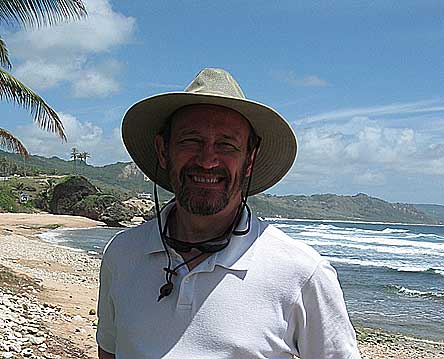 Ken Roberts:
That’s an interesting description. I might mention that I’m
a great admirer of the Japanese aptitude for constructing those little
meaningfully-dense verbal bundles. To the west of Denver lies Guanella
Pass, a destination many Coloradans depart for in the early fall as
the Aspen leaves explode there in golden magnificence. Every lungful
of the crisp air is like champagne, and the mountain roads wind from
one breath-taking view to another, and still another, and yet another,
mile after mile. The whole experience is like one long, extravagant
celebration of color itself – or even of existence itself. It’s
a very, very heady, joy-evoking experience. The Mammas &
the Pappas should have dropped by. They’d have had a lot
more to sing about.
Ken Roberts:
That’s an interesting description. I might mention that I’m
a great admirer of the Japanese aptitude for constructing those little
meaningfully-dense verbal bundles. To the west of Denver lies Guanella
Pass, a destination many Coloradans depart for in the early fall as
the Aspen leaves explode there in golden magnificence. Every lungful
of the crisp air is like champagne, and the mountain roads wind from
one breath-taking view to another, and still another, and yet another,
mile after mile. The whole experience is like one long, extravagant
celebration of color itself – or even of existence itself. It’s
a very, very heady, joy-evoking experience. The Mammas &
the Pappas should have dropped by. They’d have had a lot
more to sing about.
Megan Buness: This song is so happy. I love the sunlight. I
remember seeing marketing in recent years that Colorado has more sunny
days than Hawaii. It's sunny here, yet one gets to enjoy all the seasons
as well.
mwe3: “Passing Sacred Ground” , lost my way…
it’s kind of a protest song during the cyber era… is it
futuristic?
Megan Buness: It was created in a futuristic environment: our
writing group, which was largely science fiction writers. “Passing
Sacred Ground” was a challenge that Ken brought to our writing
group. He showed us “Passing Sacred Ground” by Bev Doolittle
and asked each of us to come up with a story related to this scene.
Dappled horses are passing through dense aspen trees against a rock
laced snowy ground. As I looked at the artwork, I had solve "Is
this horse?" Does this have meaning? Or is it background. The
lyrics unfolded from there.
mwe3: Who is “Welcome To Life” inspired by?
Ken Roberts: This composition was inspired by and is dedicated
to my grand-daughter, Alice. I could almost groan aloud whenever I
hear that wretched musical catastrophe we know as “Happy Birthday
to You”. I plan to play this track for her every year as an act
of self-preservation. Megan’s wonderful, tender lyric for it
must have been prescient, as she’s now expecting her first.
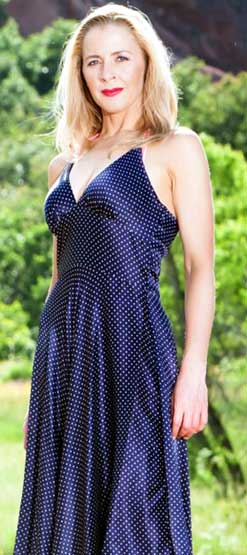 Megan
Buness: I am delighted by this song. I wrote the lyrics before
I was pregnant. It's all the joy of 'here you come!' and welcome to
this thing that we are all enjoying: life. Now I sing the lyrics to
my abdomen.
Megan
Buness: I am delighted by this song. I wrote the lyrics before
I was pregnant. It's all the joy of 'here you come!' and welcome to
this thing that we are all enjoying: life. Now I sing the lyrics to
my abdomen.
mwe3: Of course “AOC”, Ms. Cortez, is a woman most
people have heard this past year! What do you like best about her
and the whole left / centrist rift going on? Seems like the left has
splintered badly these past 20 years, I was a huge Al Gore supporter,
and the newcomers like the young kids seem very polarized and this
year is shaping up to be very contested. It seems like it’s almost
impossible for US to get there. Last about “AOC” one viewer
writes in and asks me “why don’t they do more rhythms and
beats like this stomper?”
Ken Roberts: Well, she’s much like a rose on a dung heap,
isn’t she? I’ve listened to her grilling sour, disgraceful
billionaires, and, to switch metaphors, it’s like a breath of
fresh air in a morgue – the morgue of American democratic ideals.
The rift between the left as represented by AOC and Bernie Sanders
and the party elites strikes me as being something like the rift between
the traditional Republican oligarchs and the “Tea Party”.
That is, it’s essentially a populist reaction against the political
corruption so detested by most of the right and left alike. What’s
a little different in this election cycle is that it’s now become
painfully clear that the media thinks that it alone should tell the
public who to choose by deciding for them who is and isn’t “electable”.
The task of presenting the facts seems to have gone as far missing
with them as it has with Trump. Consequently, we’re saddled with
a fake media and a fake president, too. This is far indeed from what
the founding fathers had in mind.
Well, I’m not sure who the “they” is in this question.
If it’s bands in general, it may be that a lot of people are
in no mood to write anything of this kind in the current climate.
It’s also a lot harder to do than one might suppose. Comedy writing
is something like that. When it’s good, it seems inevitable,
and yet everything has to be carefully set up to deliver the punchlines,
and it’s only too easy to try and fail. Think of “The Love
Guru” where Myers, who once knew what was funny in some other
life, somehow goes completely bottoms-up for an agonizing hour and
a half. One critic said something like “I left the film uncertain
whether I’d ever laugh again.” Finally, writing high-energy
music itself requires high energy. I recently finished composing a
somewhat similar piece, and by the time I’d finished I was a
little worn. You’ve got to not only enter into the mood of what
you’re writing, you’ve got to stay there until you’re
done – and keep in mind that even four minutes of music can takes
weeks or even months to put together. Sometimes things break your
way creatively, and sometimes they stubbornly refuse to.
Megan Buness: I easily can remember when we all took notice
of AOC. Her voice came at a time when we most needed it. Ken's music
and lyrics communicate the levity of her impact on us.
mwe3: So tell us more about what Moon Over Mountain is up to
and what your plans are for 2020. Any hopes and wishes, words of inspiration
you can share with the readers?
 Ken
Roberts: Well, Megan will be busy with a new family member, which
may keep her away from the piano for a little while. But we’ve
already done most of the work for the next album, so we’ll be
fine-tuning that material. I’ve written several longer, semi-symphonic
pieces and we’re weighing how best to get those out to people.
Possibly they’ll come out as singles. We’ve also discussed
doing a “theme” album that would be something like “the
bright side of the moon” – that is, instead of writing about
quiet desperation we’d be writing about secret joy. I’m
afraid that the corona virus news is likely to be bad for quite a
while. People may need reminding that there’s more to life than
misery.
Ken
Roberts: Well, Megan will be busy with a new family member, which
may keep her away from the piano for a little while. But we’ve
already done most of the work for the next album, so we’ll be
fine-tuning that material. I’ve written several longer, semi-symphonic
pieces and we’re weighing how best to get those out to people.
Possibly they’ll come out as singles. We’ve also discussed
doing a “theme” album that would be something like “the
bright side of the moon” – that is, instead of writing about
quiet desperation we’d be writing about secret joy. I’m
afraid that the corona virus news is likely to be bad for quite a
while. People may need reminding that there’s more to life than
misery.
Overall, this is no time for despair. The dove-tailing pandemic and
climate and economic crises will demand that we rise above the politics
and rhetoric of greed. If we don’t pull together now, a very
dystopian future may well await us. Nobody can save the world alone,
but all of us can do whatever it is in our power to do. Despair never
facilitates that aim. Rather surprisingly, the happiest people in
the world are the Finns, and yet their country has few resources and
their climate could hardly be worse. It turns out that their surprising
secret is to work together to achieve just outcomes and a high quality
of life for everyone. Even in the worst crisis, that should remain
our goal. The alternatives are just too awful to contemplate.
Megan Buness: We are continuing the creative process, unearthing
our hopes and beliefs which we are sharing with you: one thread in
this album is the meaning found in spending time with loved ones.



